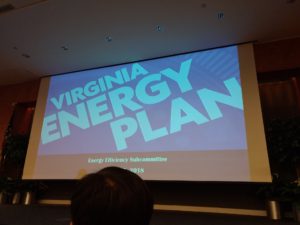Virginia Energy Plan
 By October 1st, the State Energy Office of the Department of Mines, Minerals and Energy (DMME) must prepare an Energy Plan that covers a 10 year period and submit that plan to the Governor, the SCC Commissioners and the General Assembly. This Energy Plan is required to propose actions that are consistent with the Commonwealth’s Energy Objectives (VA. Code 67-201) including projections of energy consumption, analysis of efficient use of energy resources and conservation initiatives, analysis of whether there is a disproportionate adverse impact on economically disadvantaged or minority communities, and recommendations for legislative, regulatory, and other public and private actions.
By October 1st, the State Energy Office of the Department of Mines, Minerals and Energy (DMME) must prepare an Energy Plan that covers a 10 year period and submit that plan to the Governor, the SCC Commissioners and the General Assembly. This Energy Plan is required to propose actions that are consistent with the Commonwealth’s Energy Objectives (VA. Code 67-201) including projections of energy consumption, analysis of efficient use of energy resources and conservation initiatives, analysis of whether there is a disproportionate adverse impact on economically disadvantaged or minority communities, and recommendations for legislative, regulatory, and other public and private actions.
This year’s plan, however, will have a slightly different focus. The DMME is pushing for a greater emphasis on outcomes and how this goal can be achieved through policy. In order for this plan to be the most effective and include the most input, DMME will rely on community involvement. Specifically, they want the public to help answer the following questions:
- What legislative changes are needed?
- What regulatory changes are needed?
- Is there administration level action needed?
- Is there private activity needed?
Slides from all meetings will be posted on this website and are open for public viewing. The public has until August 24th to submit comments online to the website.
In addition to the written comments, there will also be four listening session that the public can attend:
- July 23 from 1-4 PM House Room 1 of the Capitol in Richmond
- Solar Energy Development and Energy Storage Authority Meeting and Listening Session
- July 25 from 12-2 PM in Newport News
- Offshore Wind Energy Stakeholder Meeting and Listening Session
- July 30 from 5-7 PM in Roanoke
- Public Listening Session
The Virginia Energy Plan will have five tracks and each will have their own focus areas:
- Solar and Wind Resources
- Energy Efficiency
- Electric Vehicles and Advanced Transportation
- Storage
- Offshore Wind
The four focus areas for energy efficiency are:
- Achieving Virginia’s 10% energy conservation target
- Lead by example strategies
- Financing
- Program design for DMME-funded programs.
The first kickoff meeting of three energy efficiency events was held on June 25th, which included a presentation by DMME on the final recommendations from the Governor’s Executive Committee on Energy efficiency (GEC) and the next steps. There was also an open discussion with the audience on additional topics for inclusion in the energy plan.
Below you will find the list of the completed tasks related to EE since the previous energy plan update:
- established the GEC
- enacted legislation facilitating Commercial Property Assessed Clean Energy (C-PACE)
- launched the VirginiaSaves program to provide additional financing mechanisms for efficiency programs (federal funding mechanism not reauthorized)
- developed a streamlined energy performance contracting program from Virginia facilities
- strengthened the Commonwealth’s building codes
DMME also presented these ongoing recommendations:
- Reach the voluntary goal of reducing energy consumption by 10 percent by 2020
- Reduce electricity consumption in state facilities by 15% through EPC by 2017
- Create central State facility energy data registry and dashboard to track energy consumption in State agencies
- Engage social entrepreneurs to explore and implement innovative models to aid ee
During the public discussion, the VAEEC commented that in order to achieve Virginia’s 10% energy conservation target, local government programs must be included and the $1.2B spending commitment by utilities in SB 966 has the potential to make a big impact on this goal. In addition, we also provided ideas for each of the other focus areas, including establishing a benchmarking program for all public buildings as a lead-by-example strategy, continuing to support the Mid-Atlantic PACE Alliance (MAPA) efforts to support localities interested in creating C-PACE financing programs, promoting the new Energy Performance Contracting guidelines and potential opportunities through the new Carbon Rule as ideas for program design for DMME-funded programs.
There will be two more meetings of the energy efficiency stakeholder group with discussions on specific focus areas:
- July 18th- achieving Virginia’s 10% energy conservation target and lead by example strategies. Localities are strongly encouraged to attend.
- August 1st- financing and program design for DMME-funded programs. Energy Service Companies and PACE advocates are strongly encouraged to attend.
Don’t miss on your opportunity to provide input on the Virginia Energy Plan. To learn more about the Virginia Energy Plan or to find details on meeting times and locations, please check the website.
